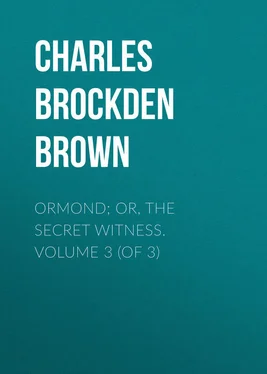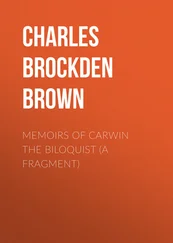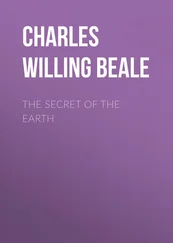Charles Brown - Ormond; Or, The Secret Witness. Volume 3 (of 3)
Здесь есть возможность читать онлайн «Charles Brown - Ormond; Or, The Secret Witness. Volume 3 (of 3)» — ознакомительный отрывок электронной книги совершенно бесплатно, а после прочтения отрывка купить полную версию. В некоторых случаях можно слушать аудио, скачать через торрент в формате fb2 и присутствует краткое содержание. Жанр: foreign_antique, foreign_prose, на английском языке. Описание произведения, (предисловие) а так же отзывы посетителей доступны на портале библиотеки ЛибКат.
- Название:Ormond; Or, The Secret Witness. Volume 3 (of 3)
- Автор:
- Жанр:
- Год:неизвестен
- ISBN:нет данных
- Рейтинг книги:4 / 5. Голосов: 1
-
Избранное:Добавить в избранное
- Отзывы:
-
Ваша оценка:
- 80
- 1
- 2
- 3
- 4
- 5
Ormond; Or, The Secret Witness. Volume 3 (of 3): краткое содержание, описание и аннотация
Предлагаем к чтению аннотацию, описание, краткое содержание или предисловие (зависит от того, что написал сам автор книги «Ormond; Or, The Secret Witness. Volume 3 (of 3)»). Если вы не нашли необходимую информацию о книге — напишите в комментариях, мы постараемся отыскать её.
Ormond; Or, The Secret Witness. Volume 3 (of 3) — читать онлайн ознакомительный отрывок
Ниже представлен текст книги, разбитый по страницам. Система сохранения места последней прочитанной страницы, позволяет с удобством читать онлайн бесплатно книгу «Ormond; Or, The Secret Witness. Volume 3 (of 3)», без необходимости каждый раз заново искать на чём Вы остановились. Поставьте закладку, и сможете в любой момент перейти на страницу, на которой закончили чтение.
Интервал:
Закладка:
"A fortunate shot, by dismasting the enemy, allowed us to prosecute our voyage unmolested. At Cape François we found a ship which transported us, after various perils, to Richmond, in Virginia. I will not carry you through the adventures of four years. You, sitting all your life in peaceful corners, can scarcely imagine that variety of hardship and turmoil which attends the female who lives in a camp.
"Few would sustain these hardships with better grace than I did. I could seldom be prevailed on to remain at a distance, and inactive, when my husband was in battle, and more than once rescued him from death by the seasonable destruction of his adversary.
"At the repulse of the Americans at Germantown, Wentworth was wounded and taken prisoner. I obtained permission to attend his sick-bed and supply that care without which he would assuredly have died. Being imperfectly recovered, he was sent to England and subjected to a rigorous imprisonment. Milder treatment might have permitted his complete restoration to health; but, as it was, he died.
"His kindred were noble, and rich, and powerful; but it was difficult to make them acquainted with Wentworth's situation. Their assistance, when demanded, was readily afforded; but it came too late to prevent his death. Me they snatched from my voluntary prison, and employed every friendly art to efface from my mind the images of recent calamity.
"Wentworth's singularities of conduct and opinion had estranged him at an early age from his family. They felt little regret at his fate, but every motive concurred to secure their affection and succour to me. My character was known to many officers, returned from America, whose report, joined with the influence of my conversation, rendered me an object to be gazed at by thousands. Strange vicissitude! Now immersed in the infection of a military hospital, the sport of a wayward fortune, struggling with cold and hunger, with negligence and contumely. A month after, passing into scenes of gayety and luxury, exhibited at operas and masquerades, made the theme of inquiry and encomium at every place of resort, and caressed by the most illustrious among the votaries of science and the advocates of the American cause.
"Here I again met Madame de Leyva. This woman was perpetually assuming new forms. She was a sincere convert to the Catholic religion, but she was open to every new impression. She was the dupe of every powerful reasoner, and assumed with equal facility the most opposite shapes. She had again reverted to the Protestant religion, and, governed by a headlong zeal in whatever cause she engaged, she had sacrificed her husband and child to a new conviction.
"The instrument of this change was a man who passed, at that time, for a Frenchman. He was young, accomplished, and addressful, but was not suspected of having been prompted by illicit views, or of having seduced the lady from allegiance to her husband as well as to her God. De Leyva, however, who was sincere in his religion as well as his love, was hasty to avenge this injury, and, in a contest with the Frenchman, was killed. His wife adopted at once her ancient religion and country, and was once more an Englishwoman.
"At our meeting her affection for me seemed to be revived, and the most passionate entreaties were used to detain me in England. My previous arrangements would not suffer it. I foresaw restraints and inconveniences from the violence and caprice of her passions, and intended henceforth to keep my liberty inviolate by any species of engagement, either of friendship or marriage. My habits were French, and I proposed henceforward to take up my abode at Paris. Since his voyage to Guiana, I had heard no tidings of Sebastian Roselli. This man's image was cherished with filial emotions, and I conceived that the sight of him would amply reward a longer journey than from London to Marseilles.
"Beyond my hopes, I found him in his ancient abode. The voyage, and a residence of three years at Cayenne, had been beneficial to his appearance and health. He greeted me with paternal tenderness, and admitted me to a full participation of his fortune, which the sale of his American property had greatly enhanced. He was a stranger to the fate of my brother. On his return home he had gone to Switzerland, with a view of ascertaining his destiny. The youth, a few months after his arrival at Lausanne, had eloped with a companion, and had hitherto eluded all Roselli's searches and inquiries. My father was easily prevailed upon to transfer his residence from Provence to Paris."
Here Martinette paused, and, marking the clock, "It is time," resumed she, "to begone. Are you not weary of my tale? On the day I entered France, I entered the twenty-third year of my age, so that my promise of detailing my youthful adventures is fulfilled. I must away. Till we meet again, farewell."
CHAPTER II
Such was the wild series of Martinette's adventures. Each incident fastened on the memory of Constantia, and gave birth to numberless reflections. Her prospect of mankind seemed to be enlarged, on a sudden, to double its ancient dimensions. Ormond's narratives had carried her beyond the Mississippi, and into the deserts of Siberia. He had recounted the perils of a Russian war, and painted the manners of Mongols and Naudowessies. Her new friend had led her back to the civilized world and portrayed the other half of the species. Men, in their two forms of savage and refined, had been scrutinized by these observers; and what was wanting in the delineations of the one was liberally supplied by the other.
Eleven years in the life of Martinette was unrelated. Her conversation suggested the opinion that this interval had been spent in France. It was obvious to suppose that a woman thus fearless and sagacious had not been inactive at a period like the present, which called forth talents and courage without distinction of sex, and had been particularly distinguished by female enterprise and heroism. Her name easily led to the suspicion of concurrence with the subverters of monarchy, and of participation in their fall. Her flight from the merciless tribunals of the faction that now reigned would explain present appearances.
Martinette brought to their next interview an air of uncommon exultation. On this being remarked, she communicated the tidings of the fall of the sanguinary tyranny of Robespierre. Her eyes sparkled, and every feature was pregnant with delight, while she unfolded, with her accustomed energy, the particulars of this tremendous revolution. The blood which it occasioned to flow was mentioned without any symptoms of disgust or horror.
Constantia ventured to ask if this incident was likely to influence her own condition.
"Yes. It will open the way for my return."
"Then you think of returning to a scene of so much danger?"
"Danger, my girl? It is my element. I am an adorer of liberty, and liberty without peril can never exist."
"But so much bloodshed and injustice! Does not your heart shrink from the view of a scene of massacre and tumult, such as Paris has lately exhibited and will probably continue to exhibit?"
"Thou talkest, Constantia, in a way scarcely worthy of thy good sense. Have I not been three years in a camp? What are bleeding wounds and mangled corpses, when accustomed to the daily sight of them for years? Am I not a lover of liberty? and must I not exult in the fall of tyrants, and regret only that my hand had no share in their destruction?"
"But a woman – how can the heart of woman be inured to the shedding of blood?"
"Have women, I beseech thee, no capacity to reason and infer? Are they less open than men to the influence of habit? My hand never faltered when liberty demanded the victim. If thou wert with me at Paris, I could show thee a fusil of two barrels, which is precious beyond any other relic, merely because it enabled me to kill thirteen officers at Jemappe. Two of these were emigrant nobles, whom I knew and loved before the Revolution, but the cause they had since espoused cancelled their claims to mercy."
Читать дальшеИнтервал:
Закладка:
Похожие книги на «Ormond; Or, The Secret Witness. Volume 3 (of 3)»
Представляем Вашему вниманию похожие книги на «Ormond; Or, The Secret Witness. Volume 3 (of 3)» списком для выбора. Мы отобрали схожую по названию и смыслу литературу в надежде предоставить читателям больше вариантов отыскать новые, интересные, ещё непрочитанные произведения.
Обсуждение, отзывы о книге «Ormond; Or, The Secret Witness. Volume 3 (of 3)» и просто собственные мнения читателей. Оставьте ваши комментарии, напишите, что Вы думаете о произведении, его смысле или главных героях. Укажите что конкретно понравилось, а что нет, и почему Вы так считаете.












